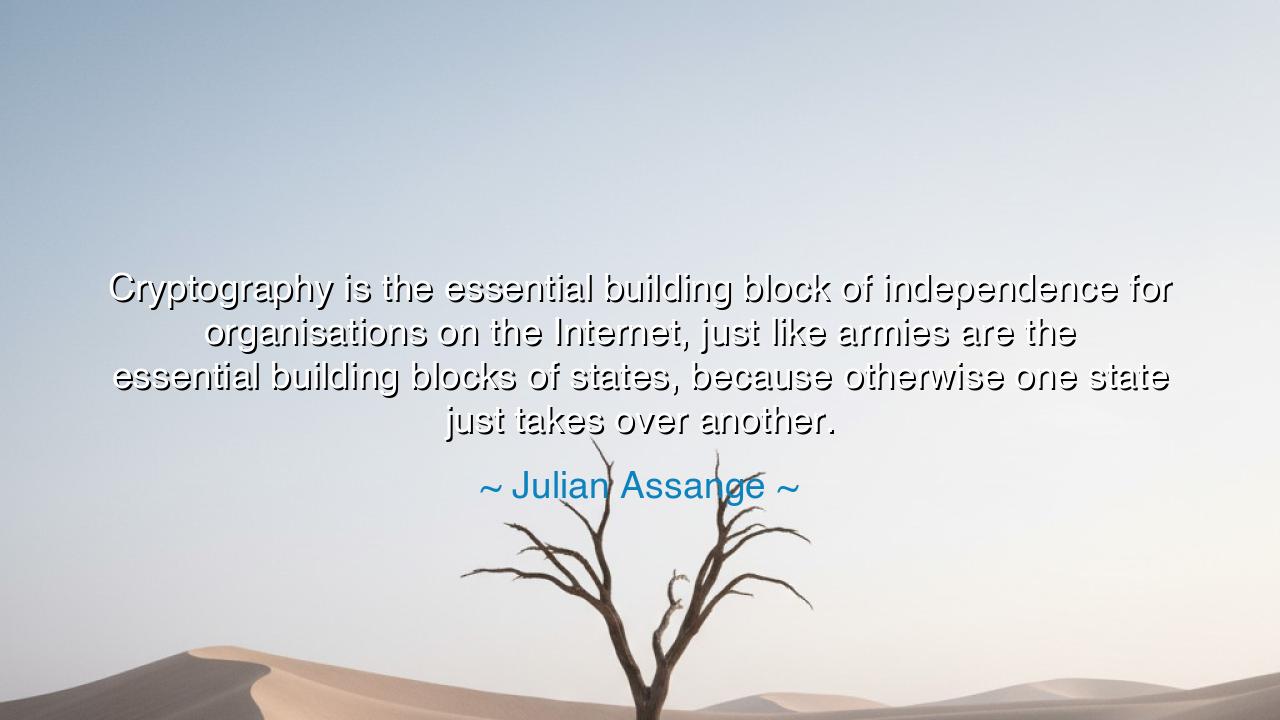
Cryptography is the essential building block of independence for
Cryptography is the essential building block of independence for organisations on the Internet, just like armies are the essential building blocks of states, because otherwise one state just takes over another.






In the age of empires, men built fortresses of stone and forged armies of iron to defend their independence. In our own age, where battles are fought not with swords but with information, a new fortress has arisen — unseen, silent, yet powerful beyond measure. When Julian Assange declared, “Cryptography is the essential building block of independence for organisations on the Internet, just like armies are the essential building blocks of states, because otherwise one state just takes over another,” he spoke as one who saw the world shifting beneath his feet. His words are both warning and prophecy: that in the realm of the digital, freedom without protection is an illusion, and that privacy, once surrendered, becomes the death of sovereignty.
To grasp the depth of his meaning, one must first understand what cryptography truly is. It is the art of concealment, the sacred science of protecting truth from the reach of power. In ancient times, generals and kings used secret codes to guard their plans from the enemy’s spies. But in the modern world, Assange saw a greater war — not for land, but for information. Governments, corporations, and unseen forces vie for control of the digital spaces where ideas, knowledge, and identities live. In such a world, cryptography becomes the shield of independence, the guardian that allows free minds and organisations to exist beyond the grasp of those who would monitor, silence, or subdue them.
Assange’s analogy is as ancient as it is profound. Just as the army defends the physical sovereignty of a nation, encryption defends the intellectual and digital sovereignty of communities and individuals. A nation without an army, in the old world, was an open invitation to conquest. So too, in this new age, an organisation or society without digital protection becomes prey to surveillance, censorship, and manipulation. Assange’s words were not born from paranoia but from historical continuity — the eternal truth that power, left unchecked, consumes. The tools of control have merely changed their form: the sword is now an algorithm, the fortress a server, the spy a line of code.
History itself confirms his insight. Consider the fall of empires that failed to defend their communication. In the Second World War, the Allies cracked the Enigma cipher, and through that triumph of intellect and secrecy, turned the tide of history. Those who protected their secrets survived; those who exposed them perished. Likewise, in the realm of digital sovereignty, those who guard their data with encryption preserve freedom; those who do not are conquered not by armies, but by the quiet theft of their voices, their movements, their minds.
Assange’s warning was also born from his own struggle. Through his work with WikiLeaks, he witnessed how nations cloak corruption behind the veil of secrecy while demanding transparency from the people. To him, cryptography was not a tool of rebellion, but of balance — a way for ordinary individuals and organisations to reclaim their dignity in a world of omnipresent surveillance. He understood that when only the powerful have secrets, freedom dies, for transparency without privacy is merely another form of control. In his eyes, cryptography was the modern sword of justice, allowing the weak to defend themselves in a battlefield where strength is measured not in armies, but in information.
And yet, his words carry a broader, almost spiritual lesson. He reminds us that independence, whether of nations or of souls, must always be guarded. The means may change — stone walls give way to firewalls, shields to encryption keys — but the principle remains the same. Freedom without defense is vulnerability disguised as peace. The digital world, like the physical one before it, demands vigilance. To build a truly independent society — online or off — one must understand that security and liberty are not opposites, but companions, each meaningless without the other.
So, my child, take this wisdom into your age of networks and clouds: cherish your privacy as your ancestors cherished their borders. Learn the ways of cryptography, for it is the armor of your freedom in the new world. Guard your data as you would guard your home, your words as you would guard your honor. For if you surrender the keys to your own mind, another will soon rule it. As Julian Assange foresaw, the struggle for independence has not ended — it has merely changed its form. The battlefield is invisible now, but the call remains the same as it was in every age: Protect what is yours, or lose it to those who hunger for dominion.






AAdministratorAdministrator
Welcome, honored guests. Please leave a comment, we will respond soon